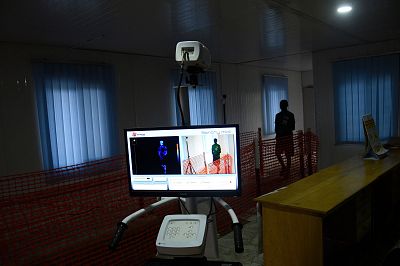The World Health Organization said that the outbreak has neared 3,000 cases since it was declared in August 2018.
KAMPALA, Uganda — A 9-year-old Congolese girl who tested positive for Ebolain neighboring Uganda has died, officials said Friday, as the World Health Organization said that the outbreak has neared 3,000 cases.
The girl's body will be repatriated with her mother back to Congo for a funeral, according to Dr. Eddy Kasenda, Ebola representative in the Congolese border town of Kasindi.
"We are finalizing the administrative formalities so that the body is repatriated and buried here in Congo, her native country," said Kasenda. "We are collaborating with the health services of neighboring Uganda and we will strengthen the sanitary measures here in Kasindi."
Health
A Ugandan official at the hospital where the girl had been in isolation confirmed her death overnight. He spoke on condition of anonymity because he was not authorized to speak to reporters.
The girl, who was traveling with her mother, was identified at a border screening Wednesday as a possible Ebola patient and isolated.
Although cases of cross-border contamination have been rare, this case highlights the risk of Ebola spreading across the border into neighboring Uganda and Rwanda. Borders in the region are often porous, and many people traveling at night use bush paths to cross over.
In June,a family of Congolese with some sick family members crossed into Uganda via a bush path. Two of them later died of Ebola, and the others were transferred back to Congo.
Uganda has had multiple outbreaks of Ebola and hemorrhagic fevers since 2000.
Because the 9-year-old Ebola victim passed through an official entry point this week, Ugandan health authorities believe she had no contact with any Ugandan.
Ebola has killed nearly 2,000 people in eastern Congo since August 2018. The disease is spread through contact with the bodily fluids of an infected person.
WHO said Friday that the total cases have reached 3,000 in Congo, with 1,893 confirmed deaths and some 900 survivors. An average of 80 people per week are sickened by the virus, which has infected most people in Congo's North Kivu province.
The Ebola outbreak in eastern Congo hasn't shown signs of slowing down despite new treatments and vaccines given to more than 200,000 people in the region and the use of two therapeutic treatments being used as part of a clinical trial.
Insecurity has been one factor in a region where rebel groups have fought for control of mineral-rich lands for decades. Ebola also has spread because of mistrust by communities who have also staged attacks against health workers. Many people in eastern Congo don't trustdoctors and other medics.
"Many people are afraid to seek treatment for illnesses, worried they will be sent to an Ebola Treatment Center where they fear they could contract the disease. As an actor within the response, we must assume our own responsibility," said Bob Kitchen, Vice President of Emergencies at the International Rescue Committee.
WHO Director-General Tedros Adhanom Ghebreyesus will travel this weekend to Congo with United Nations Secretary-General Antonio Guterres and senior officials, including Dr. Matshidiso Moeti, WHO Regional Director for Africa.
On Friday, he called on partners to increase their presence in the field.
"Building strong (health) systems is what will protect people, communities and the world," said Ghebreyesus.












